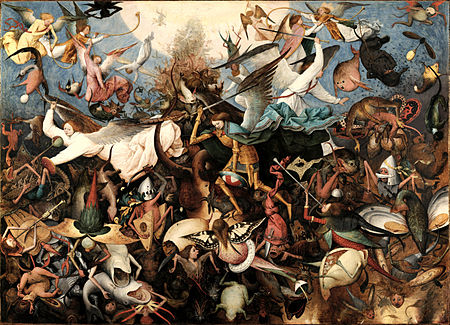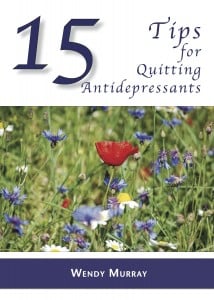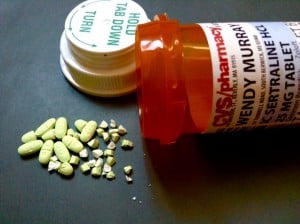
(Public Domain)
Continuing my series, this Mental Health Awareness month, about my journey to quit antidepressants, this post describes the point when I made the decision to finally be rid of them.
A passage from John Milton’s Paradise Lost captures the picture of my relationship with antidepressants at that point, and the struggle to be rid of them:
“[You] feel by turns the bitter change;
Of fierce extremes, extremes more fierce
From beds of raging fire to starve in ice
Their soft ethereal warmth, and there to pine
Immovable, infixed, and frozen round,
Periods of time . . .
“No rest; through many a dark and dreary vale
They passed, and many a region dolorous,
O’er many a froze, many a fiery Alp,
Rocks, caves, lakes, fens, bogs, dens, and shades of death,
A universe of death . . .
It was a long, tedious and epic slog that summoned every ounce of human grit from every corner of my physical, emotional and spiritual apparatus. I came to learn that this is also the picture of millions of other strugglers’ relationships with antidepressants. We are hidden band fighting epic battles inside our minds even as we do the laundry, check out books from the library or show up to work.
I had no idea then how taking an antidepressant during a rough stretch of my life — a seemingly logical and life-giving step — would alter my life, affect parts of my interior architecture and, for a long time, control my destiny. All of this will be explored in the subsequent posts, which, thankfully, recount not only my trial but also my eventual deliverance from these meds.
I write because during the dark isolating moments of my struggle I needed desperately to know if someone — anyone, ever — had succeeded at getting off these medications. I combed internet forums typing in “success stories” and found precious few. I have since understood that there are many (hard-won) success stories, yet often once a person has navigated this ordeal, they tend to back away from forums and not continue to be active in the midst of these heart-wrenching postings. This series of posts during Mental Health Awareness month is for the people who desperately need to hear a “success story,” as I myself once did.
Over these years I learned what SSRIs do to one’s brain and what tapering SSRIs also does to one’s brain. I learned how to recognize these shocking symptoms for what they are and, with God’s help, to manage them. I also learned what it takes to prepare oneself to undertake discontinuation, physically, mentally, socially, nutritionally, relationally,  personally, bodily, and spiritually — and consolidated a workable plan in this short book (find an ebook version here). I have likewise learned that all these forces must be summoned in concert in order to advance in this battle if we are going to survive it.
personally, bodily, and spiritually — and consolidated a workable plan in this short book (find an ebook version here). I have likewise learned that all these forces must be summoned in concert in order to advance in this battle if we are going to survive it.
The world of the taper can be a dark and troublesome desolate landscape like that described by Milton noted above. But let us not forget that there is a second book Milton wrote bringing his story full circle: Paradise Regained. This too is part of the battle to get off antidepressant medication and it is achievable. For me, by God’s grace, after the third attempt, my feet found their footing and I emerged a survivor. It is my hope that, with patience, persistence, and a lot of self-care, Paradise Regained can be your story too.
The Day I Decided to Stop
The day I made the decision to stop taking my antidepressants began ordinarily with little forethought brought to the actual moment I’d end it. I had been tapering gradually, if casually, cutting the tablets in half in order to quit them altogether at some future, yet undetermined point. I had gone from 40mg to 20mg to 10mg to 5mg to 2.5mg of Celexa (citalopram) over a period of about six weeks. I was to learn painfully that these 50-percent incremental drops were far too abrupt. But anyway, the day I quit them altogether had fallen a mere week after the drop from 5 to 2.5. I was standing at the top of the stairs, angling to descend, and I felt something like life come to me and I met it with a bounce in my step, grabbing the banister, thinking, why — I feel good! Then I thought, Today is the day. That day I stopped the meds. I sealed the vial and closed it away in the back of a drawer never be retrieved. I was feeling good — not “neutral”; not “not depressed”; not “intense” nor agitated, nor manic. I felt good. I thought to myself, I’ve forgotten what this feels like. It was early March when I determined that this is the day it ends.
The feeling of well-being, balance, hopefulness, and courage propelled me. I thought this is the way a human being is meant to feel — the way I am meant to feel. I felt convinced that once I had made it to the end of the road with the meds I would reclaim my brain and at long last settle comfortably into that feeling of hopefulness once and for all.
As it turned out, despite all optimism, it was a very long time before I had another ebullient day such as I had experienced coming down the stairs when I decided to end the meds. I learned the hard way that there is a great chasm to be crossed in the effort get off antidepressants and that it is a treacherous advance measured only by the inch. The symptoms I experienced during discontinuation far surpassed any distress I had experienced before going on medication. This is why I have called this journey epic; it also why I have deemed it a slog.
To be continued . . .










